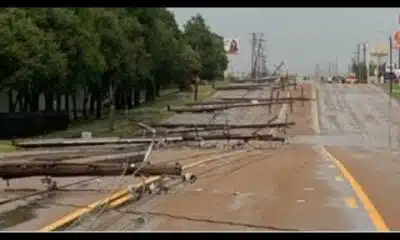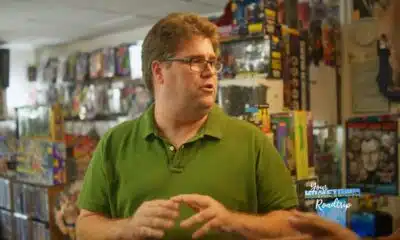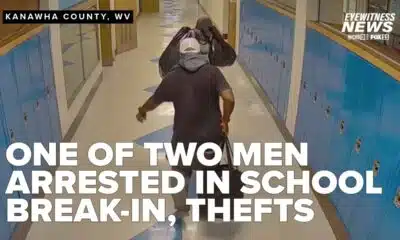News from the South - North Carolina News Feed
Yes, FCC Environmental needs to sharpen up its trash collection game in Buncombe, and it’s working on it • Asheville Watchdog
If I’ve learned anything in three decades as an observer of local governments, it’s this: Don’t mess with residents’ garbage service.
More precisely, don’t mess up garbage pickups. People really, really, really don’t like it when their trash doesn’t get hauled off.
And since FCC Environmental took over garbage collection in Buncombe County at the start of the year, it’s had a lot of problems. I know the county has heard a lot of the complaints, and so have I.
Here’s a taste of what’s hit my inbox:
“Can you find what is going on with FCC Environmental?” Leicester resident Tom Leonard wrote. “They are missing my pickup, and when I call to complain I get a help center in Colorado and all they can do is take my information and pass the ticket along. I also filed a complaint with the county on their website. They missed me completely last week, and just got the trash this week. To make matters worse, WastePro didn’t pick up my recycling at the end of December, so I have over five weeks of recycling piling up here. I just got off the phone again and got the same call center in Colorado. Can you find out what is going on there, and if they even have a plan to clean up this mess they created? There are 38 homes in the development I live in (I’m in Leicester) and we all have overflowing bins sitting by the road … waiting.”
County resident Chip Boyd was even more blunt:
“You may already be on this one, but the new waste collection contractor for Buncombe County has started out by falling flat on their face. If you look at social media like nextdoor.com and Facebook, you’ll see hundreds and hundreds of people whose trash has not been collected for weeks. The county government is not responsive, FCC’s phone lines are either closed or have a 30-minute plus wait time, and emails go unanswered. I, for example, have not had a single pickup since they took over. Of course, one expects there to be some birthing pains as a new contractor takes over, but this looks to be much, much worse. Personally, I just finished hauling a month’s worth of trash and garbage in my SUV to dispose of it, so you can imagine that my attitude about this is not very positive.”
No, I imagine not.
FCC responds: ‘It’s just hard to avoid, no matter how hard you prepare’
I reached out to Charles Merkley, vice president of business development with FCC, and he told me Thursday the company is well aware of the complaints and has worked to knock them down and add personnel and equipment.
“I think the important thing is we’re here to partner with Buncombe County and the residents, and we’re doing everything we can to be able to provide them the service that they’re paying for, that they request,” Merkley said. “That’s always our mission. Always.”
He acknowledged that early in the transition FCC had received about 400 complaints. A 45-year veteran of the waste disposal industry, Merkley said all transitions into a new market come with hiccups.

“It’s just hard to avoid, no matter how hard you prepare,” Merkley said, noting that FCC did do dry runs throughout the community before taking over. “But once you actually get live and go in there, there is always something. New equipment — brand new carts we buy, they break, unfortunately.”
FCC has 43 employees in Buncombe County, including 32 drivers. The company has 32 trucks working the county, with eight additional trucks in support roles.
Asked if FCC hired former workers from Waste Pro, which previously held the garbage contract for the county, Merkley said, “Not many.”
“But we did get a lot of local, experienced people that may have worked in the industry previously,” Merkley said. “Our general manager is very, very local and very familiar with Buncombe County and the collection routing. He’s worked with other companies doing that.”
One issue has been the mountain terrain and in some cases narrow, steep roads that require specialty vehicles or four-wheel-drive trucks.
“We’ve added additional pieces of equipment over and above the scheduled routes that are scheduled, and that’s eight to 10 pieces of equipment, along with drivers,” Merkley said. “They’re coming from all over the country that are part of our startup teams.”
Some of these veteran drivers are mentoring newer FCC workers, or in some cases driving the vehicles and teaching employees the nuances of the equipment, Merkley said.
Merkley said FCC typically handles complaint calls locally but was overloaded early on.
FCC has a half-dozen people in Buncombe to handle phone calls, and the first backup for that is another center in Houston, where FCC is headquartered. Calls go to those two places first, then to Colorado, which is FCC’s “external, global call center.”
“And unfortunately, they’re trained as best they can be, but they don’t always know specific answers, and that’s why we like to do it local,” Merkley said. “And we feel very strongly that as of now, and even by towards the end of the month, that all the external calls won’t be necessary.”
By the way, Leonard emailed me Friday to say FCC made it out to his neighborhood, Newfound Estates, the day before.
“They came and got the recycling for the whole subdivision,” Leonard told me via email. “I don’t think they would have gotten it if they didn’t hear from you. Now if they pick us up on Monday, that will clear out all that I had piled up here from the last five weeks.”
Fingers crossed, Tom.
Buncombe: ‘Our community has already endured enough challenges’
Buncombe County Manager Avril Pinder addressed the FCC issues at the Jan. 22 community briefing.
“We know the delays and missed pickups have been incredibly frustrating,” Pinder said. “Our community has already endured enough challenges.”
To be fair, FCC got knocked back a day last week because of icy conditions Monday, so it was finishing up pickups on Saturday instead of Friday. But Pinder acknowledged the other customer complaints.
“We have set an action plan for FCC, and our expectations are for them to maintain a 98 percent collection rate beginning Feb. 1,” Pinder said. “They have agreed to this, and they are continuing to increase staffing and resources to get the job done that we’ve hired them to do.”
I’m glad that FCC is knocking down the complaints, because Buncombe has a history of poor garbage collection service. If you’ve been here since 2010 or thereabouts and live in the unincorporated parts of Buncombe County, you probably have not-so-fond memories of Waste Pro’s startup here, and its collection woes that continued sporadically for years.

In June 2015 I wrote an article for the Citizen Times with the headline, “Buncombe trash contract to be rebid after Waste Pro issue.” The county was miffed about collection issues resulting in a deluge of complaints, “problems mostly driven by too few workers and equipment problems,” I wrote.
Back then, former Waste Pro spokesman Ron Pecora said the company was getting back on track after adding workers. This will sound familiar:
“We are doing everything we said we would and more in terms of people and equipment,” Pecora said in 2015. “Calls are dramatically down and we are caught up. We have made our promises and commitments, which will become obvious rather than (talking) about what we will do.”
The county and Waste Pro worked out their differences, and the contract continued through the end of last year. Buncombe chose FCC in part because the company’s rates were slightly lower than Waste Pro’s proposal.
Buncombe County Board of Commissioners Chair Amanda Edwards told me the FCC topic is definitely on her radar — and poor service is unacceptable.
“We are working very closely with our solid waste team to get each and every one of these (complaints) addressed, and we do expect better service and better customer service for the residents of Buncombe County,” Edwards said.
I told her that some folks are really riled up, especially those with trash sitting in front of their homes for weeks.
“And that’s fair,” Edwards said. “Nobody wants that sitting outside their home or their neighborhoods.”
She told me that for any FCC-related email that comes to all of the commissioners, the board’s clerk is on the case.
“She is working with the Solid Waste team to address each and every one of them,” Edwards said. “The ones that have come to me directly, I have responded to every single one of them to date, and have responded directly, and have also shared those with the Solid Waste team, who then follows up.”
She said she’s actually had some residents reach back out and thank her for responding, noting they’d heard from the Solid Waste department.
For all county residents, I’m hoping FCC has a handle on the demands of our local area, and that the service smooths out.
Meanwhile, I await your emails.
Asheville Watchdog is a nonprofit news team producing stories that matter to Asheville and Buncombe County. John Boyle has been covering Asheville and surrounding communities since the 20th century. You can reach him at (828) 337-0941, or via email at jboyle@avlwatchdog.org. The Watchdog’s local reporting is made possible by donations from the community. To show your support for this vital public service go to avlwatchdog.org/support-our-publication/.
Related
The post Yes, FCC Environmental needs to sharpen up its trash collection game in Buncombe, and it’s working on it • Asheville Watchdog appeared first on avlwatchdog.org
News from the South - North Carolina News Feed
What is Chronic Venous Insufficiency? Will Trump be okay?
SUMMARY: President Trump has been diagnosed with chronic venous insufficiency, a common condition in people over 70 causing leg swelling due to blood pooling in veins. The White House confirmed no deep vein thrombosis, arterial disease, or heart issues were found, with normal cardiac function and no signs of systemic illness. Despite visible ankle swelling and bruised hands, attributed to frequent handshaking and aspirin use, the president remains in excellent health and experiences no discomfort. At 79, he stays active, working continuously. The White House emphasized these symptoms are minor and consistent with his busy public engagements and cardiovascular prevention measures.
Swollen legs led to President Donald Trump being diagnosed with what’s called chronic venous insufficiency. It’s a fairly common condition among older adults but requires a thorough checkup to rule out more serious causes of swelling in the legs. Here are some things to know.
Chronic venous insufficiency, or CVI, happens when veins in the legs can’t properly carry blood back to the heart. That can lead to blood pooling in the lower legs. In addition to swelling, usually around the feet and ankles, symptoms can include legs that are achy, heavy feeling or tingly, and varicose veins. Severe cases could trigger leg sores known as ulcers.
WRAL App: https://www.wral.com/download-wral-apps/5787234/
The Latest Weather: https://www.wral.com/weather/page/1010362/
News Tips:
Online – https://www.wral.com/report-it/
Email – assignmentdesk@wral.com
Subscribe to WRAL:
https://youtube.com/c/wral5
Follow WRAL:
Facebook: https://facebook.com/WRALTV
X: https://twitter.com/WRAL
IG: https://instagram.com/wral
About WRAL-TV:
WRAL is your Raleigh, North Carolina news source. Check out our videos for the latest news in Raleigh, local sports, Raleigh weather, and more at https://WRAL.com
#localnews #northcarolina
News from the South - North Carolina News Feed
US House votes to yank funding for NPR, PBS, foreign aid, sending bill to Trump’s desk
SUMMARY: On July 2, 2025, the U.S. House approved legislation to cancel $9 billion in previously authorized spending on public broadcasting and foreign aid, marking only the second time in over 30 years Congress approved a presidential rescissions request. The 216-213 mostly party-line vote sends the bill to President Donald Trump for signature. The Corporation for Public Broadcasting will lose $1.1 billion in funding for NPR, PBS, and local stations. The bill also cuts $8 billion in foreign aid but protects HIV/AIDS, tuberculosis, malaria, and maternal health programs. This follows Senate approval with some adjustments and reflects the White House’s push to focus spending on American interests.
The post US House votes to yank funding for NPR, PBS, foreign aid, sending bill to Trump’s desk appeared first on ncnewsline.com
News from the South - North Carolina News Feed
Missing voter information the objection of NC search
North Carolina State Board of Elections Executive Director Sam Hayes is setting off on a mission to correct 103,000 North Carolinians’ voting records from which some information is missing.
He maintains that the process, dubbed the Registration Repair Project, will not remove any eligible voters from the state’s voter rolls.
According to the state elections board, 103,270 North Carolina registered voters have records that lack either their driver’s license number, the last four digits of their Social Security number or an indication that they have neither.
[Subscribe for FREE to Carolina Public Press’ alerts and weekend roundup newsletters]
Last year, this missing information became the stuff of headlines, lawsuits and the high-profile election protest of Republican Court of Appeals Judge Jefferson Griffin, who lost his bid for state Supreme Court to the incumbent justice, Democrat Allison Riggs, by 734 votes.
In April, the North Carolina Supreme Court declined to remove ballots from the count based on missing identification numbers; they said the state elections board, not voters, was responsible for a faulty voter registration form that didn’t make it abundantly clear that this information was required.
While Griffin lost, the issue he raised remains salient for a newly Republican elections board and the U.S. Department of Justice, which promptly sued the state board over alleged violations of the federal Help America Vote Act’s voter registration provisions.
Thursday, Hayes told reporters that a process he unveiled in late June to gather these missing identification numbers had begun in earnest.
“We must put this issue behind us so we can focus our attention squarely on preparations for accurate and secure municipal elections this fall,” he said.
The plan to collect missing information
There are two groups of voters under Hayes’ plan.
The first group includes registered voters who have never provided a driver’s license, the last four digits of their Social Security number or an affirmation that they lack both. The state elections board has asked county election boards to check their records for these numbers, in case they were provided but not correctly entered into the voting system.
In early August, the state elections board will send letters to the remaining voters in this group requesting the missing information. If affected voters do not comply, they will vote provisionally in future elections. The elections board will create a flag on these voters’ records for poll workers.
The second group includes registered voters whose records do not show that they’ve provided an identification number, but have shown additional documentation at the polls proving their identity and eligibility under HAVA. These voters may vote a regular ballot.
However, the elections board will still send them a letter in a second mailing asking for the missing identification number to bolster the state’s voter records. Even so, if they do not oblige, they still will not be at risk of being disenfranchised, NCSBE General Counsel Paul Cox said.
County election boards have already made progress, and their work will continue as the mailings go out, Hayes said.
Voters can check to see whether they’re on the list of those with missing information by using the Registration Repair Search Tool. If voters don’t want to wait for the August mailing, they can submit an updated voter registration form using their driver’s license through the online DMV portal or visit their county elections board in person with their driver’s license or Social Security card.
“We anticipate the number of voters on the list will decrease quickly as word spreads about this important effort,” Hayes said.
The State Board of Elections unanimously approved the plan last month, despite some concerns from Democrat Jeff Carmon about putting up an extra obstacle for voters because of a problem with missing information that the voters didn’t cause.
“It’s hard to understand starvation if you’ve never felt the pangs of hunger,” Carmon said. “It’s the same situation with voting obstacles. Your perspective of an obstacle may not be the same as someone who’s consistently had their identity and their validity questioned.”
Nonetheless, Carmon and fellow Democrat board member Siobhan Millen ultimately voted in support of the plan.
Same ballot, different rules
Normally, when a voter casts a provisional ballot, the county elections board determines whether their ballot counts by the post-election canvass, held nine days after an election.
Voters may have to provide documentation or information to prove their eligibility to vote in order to be accepted.
The same process applies to the 103,000 affected voters, with a catch. Their vote may be accepted for federal contests, but not state contests, due to a difference in law.

According to the DOJ’s interpretation, the National Voter Registration Act requires all provisional votes of “duly registered voters” to count, Cox said.
But the state elections board has interpreted the state Supreme Court and North Carolina Court of Appeals’ decisions in the Griffin case as requiring a driver’s license, the last four digits of a Social Security number or an affirmation that a voter has neither before accepting their votes in state and local contests.
Under a recent election law change, county election boards have three days to validate and count or reject provisional ballots.
But sometimes, mismatches happen during validation due to database trouble with reading hyphenated names or connecting maiden and married names, for example, Cox said. The board has designed a “fail safe” in case this comes up.
When there’s a mismatch during the validation process, state law allows voters to provide additional documentation — like a driver’s license, bank statement or government document with a voter’s name and address — to prove their eligibility.
“A big chunk of these voters will have already shown HAVA ID, and that’s because in the past, when this information was not supplied, the county boards would still require these voters to show that alternative form of HAVA ID when they voted for the first time,” Cox said.
Poll workers will ask provisional voters to provide this additional documentation so that they can mark it down for later, if validation doesn’t work, he added.
Democrats threaten countersuit
Last week, the Democratic National Committee threatened the state board with litigation if they went ahead with their plan regarding those with missing information.
The letter claimed that the plan would remove eligible voters from the rolls illegally.
Hayes disagrees. In his view, he’s just following the law.
“It’s not the fault of the voters,” he said. “But at the same time, we’re required by the law to go back and collect this information, which should have been done at the time, and it certainly should have been done in the intervening time.”
He also clarified that North Carolina’s photo voter ID requirement won’t suffice for the impacted voters. They still have to vote provisionally so that their identification numbers can go through the validation process, he said.
As for whether his fully fleshed out plan will appease the DNC?
“We hope so,” Hayes said.
This article first appeared on Carolina Public Press and is republished here under a Creative Commons Attribution-NoDerivatives 4.0 International License.
The post Missing voter information the objection of NC search appeared first on carolinapublicpress.org
Note: The following A.I. based commentary is not part of the original article, reproduced above, but is offered in the hopes that it will promote greater media literacy and critical thinking, by making any potential bias more visible to the reader –Staff Editor.
Political Bias Rating: Centrist
This article presents a balanced and factual report on North Carolina’s voter registration issue, focusing on the administrative process and legal context without overt editorializing. It includes perspectives from both Republican and Democratic figures, highlights legal rulings and procedural details, and covers concerns from Democrats alongside the state elections board’s explanations. The language is neutral, aiming to inform about the complexities of voter ID requirements and the Registration Repair Project without endorsing a particular political stance or framing the issue through a partisan lens.
-
News from the South - Tennessee News Feed5 days ago
Bread sold at Walmart, Kroger stores in TN, KY recalled over undeclared tree nut
-
News from the South - Arkansas News Feed7 days ago
Man shot and killed in Benton County, near Rogers
-
News from the South - Georgia News Feed1 day ago
Aiken County family fleeing to Mexico due to Trump immigration policies
-
News from the South - Alabama News Feed6 days ago
Girls Hold Lemonade Stand for St. Jude Hospital | July 12, 2025 | News 19 at 10 p.m. – Weekend
-
News from the South - Georgia News Feed7 days ago
Anti-ICE demonstrators march to Beaufort County Sheriff's Office
-
News from the South - Oklahoma News Feed7 days ago
Police say couple had 50+ animals living in home
-
Mississippi Today4 days ago
Coast judge upholds secrecy in politically charged case. Media appeals ruling.
-
Local News5 days ago
Oyster spawning begins as MDMR-USM Hatchery Program enters production phase using mobile hatchery










































